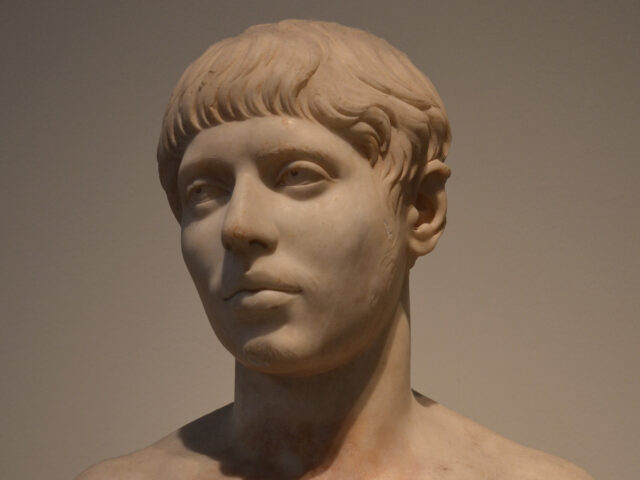A left-wing-run museum in England has pronounced that an ancient Roman Emperor from the third century was transgender and will be referred to by female pronouns to be more “inclusive”.
The North Hertfordshire Museum, run by the local council which is presently in the hands of a Liberal Democrat-Labour Party coalition, has determined that Roman Emperor Elagabalus, born Sextus Varius Avitus Bassianus, was transgender.
Based on dubious historical sources, the council determined that a display featuring a silver denarius coin produced during his reign would now refer to Elagabalus as “she” and for the coin to be used in other LGBT-themed displays, The Telegraph reported.
The decision to label the Roman ruler as trans by the woke council, which consults with the controversial LGBT charity Stonewall and the LGBT wing of the Unison trade union, was made in light of historical accounts from Roman senator and historian Cassius Dio, who claimed that Elagabalus had allegedly told a lover to “call me not lord, for I am a lady”.
Dio also claimed that the young emperor, who was assassinated at the age of 18 in 222 AD, had been referred to as “wife, mistress and queen” and had even asked for mock female genitalia to be created for him.
However, this account has been widely questioned, given that Dio was an ally of Elagabalus’ successor as emperor, Severus Alexander and therefore had a vested interest in discrediting the reputation of the slain ruler as a means of legitimising the rule of Severus.
Cambridge Classics Professor Andrew Wallace-Hadrill said: “The Romans didn’t have our idea of ‘trans’ as a category, but they used accusations of sexual behaviour ‘as a woman’ as one of the worst insults against men.
He went on to note that because Elagabalus was of Syrian heritage and not of Roman stock, there was likely “racial prejudice going on there too” in the attempts to tarnish his reputation.
Popular historian Tom Holland said: “This rests on two pretty dubious assumptions: firstly, that in this one case the notoriously unreliable sources for Elagabalus’ reign are to be trusted; and secondly, that Roman assumptions about gender can be seamlessly mapped onto those of British museum curators in 2023.”
Nevertheless, Liberal Democrat councillor Keith Hoskins, who serves as an executive member for arts on the council stated definitively: “Elagabalus most definitely preferred the she pronoun, and as such this is something we reflect when discussing her in contemporary times.
“We try to be sensitive to identifying pronouns for people in the past, as we are for people in the present. It is only polite and respectful. We know that Elagabalus identified as a woman and was explicit about which pronouns to use, which shows that pronouns are not a new thing.”
The move comes amid a wider push to credit historical figures as being homosexual or transgender. Last year, for example, Shakespeare’s Globe Theatre in London cast Joan of Arc as “gender-neutral” in a play on the Catholic patron saint of France in which she was referred to with “they/them” pronounces.

COMMENTS
Please let us know if you're having issues with commenting.